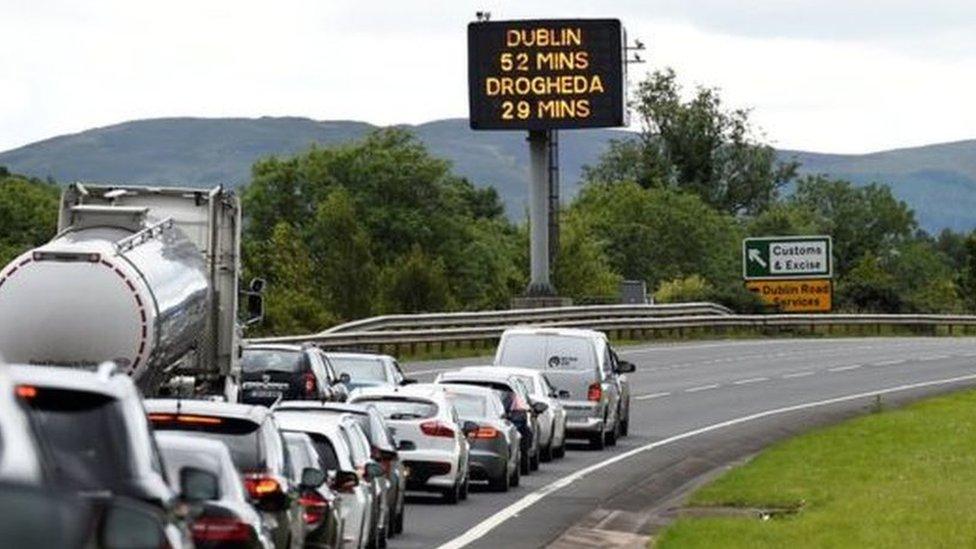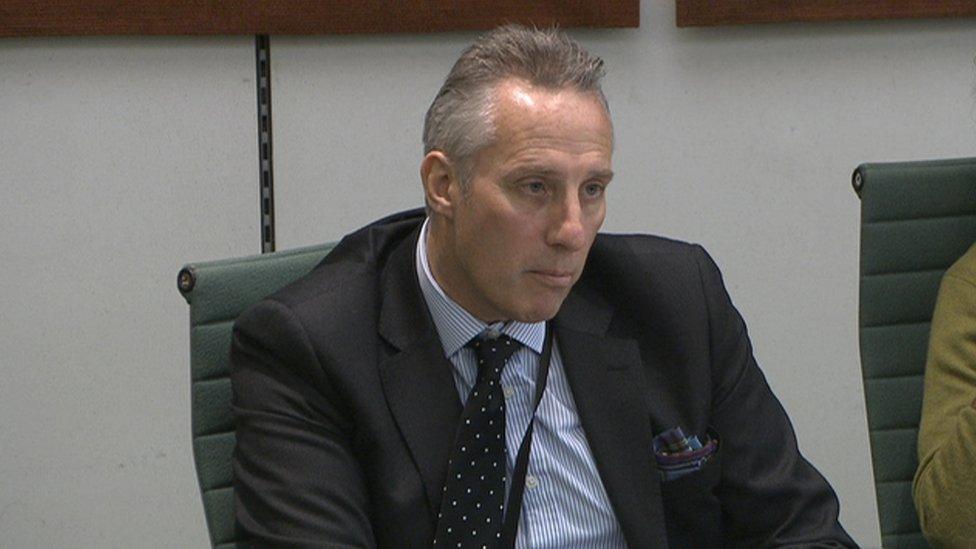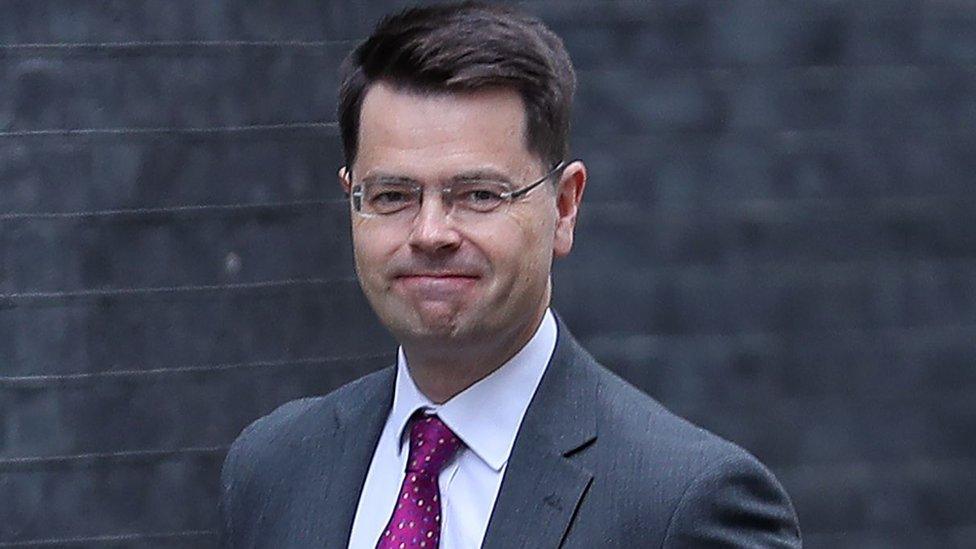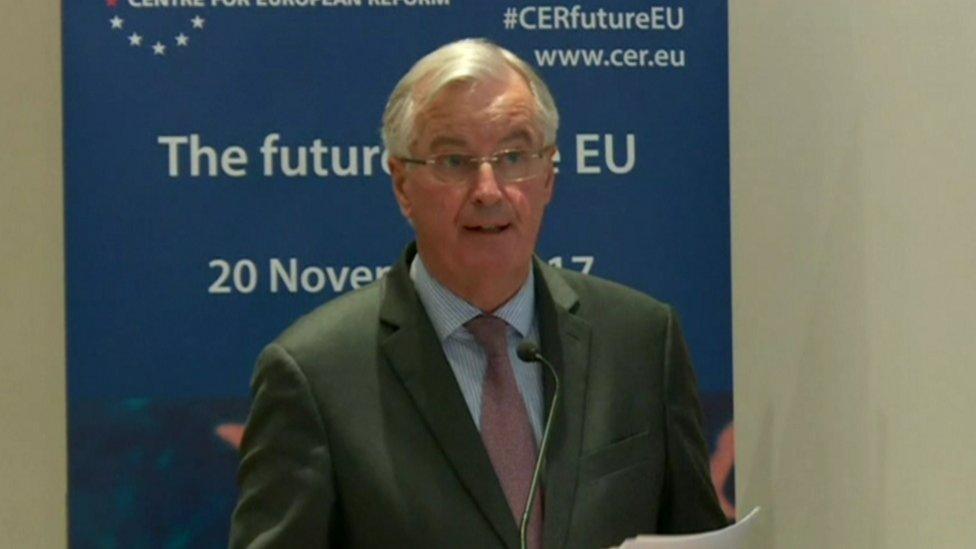Irish trade convergence 'not way forward' - Paisley
- Published
- comments

The Irish PM wanted Brexit trade talks stalled until the issue of the border was addressed
The UK should not seek convergence with EU regulations after Brexit, the DUP's Ian Paisley has said.
A Times newspaper story says Britain is prepared to offer to avoid any divergence in trade rules between Northern Ireland and the Republic.
The paper says it would devolve a package of powers to Northern Ireland to enable customs convergence on areas like agriculture and energy.
Mr Paisley said matching "red tape" was not the way ahead.
According to the paper, the government's offer would enable customs convergence in areas such as agriculture and energy.
It adds that sources in Dublin said there had been "movement" on the issue, and there was confidence a deal could be reached at the EU summit in December.
"We are not about convergence here, we are about co-operation," said the North Antrim MP.
"(Northern Ireland) will continue to trade with out biggest partner, which is the rest of the UK and I imagine that given the UK is one of the Republic of Ireland's largest trading partners that (the Republic) will want to continue to trade with us.
Will the bridge that unites the two villages be used to divide them?
"We're not about stopping that, but I'll tell you what, if you try to prevent part of the United Kingdom from leaving the EU, or trip us up, that will reflect very badly on the deals that we do after we leave."
Mr Paisley is one of 10 DUP pro-Brexit MPs who are propping up Theresa May's minority government on key votes.
The EU is concerned about how it can protect the integrity of the single market if goods which do not comply with its standards are imported across a future open border within Ireland.
'Squeaky bum time'
However, unionists and government ministers have strongly resisted the idea that there should be any checks on trade between Northern Ireland and Great Britain - claiming this would disrupt the UK's own home market.
The suggestion of regulatory changes were welcomed by Joe O'Reilly, Fine Gael spokesman on foreign affairs and trade in the Irish Senate, who said they would represent "a massive move towards a frictionless border".

Ian Paisley said matching "red tape" was not the way ahead.
"To have a different tariff regime would very adversely affect agriculture and a lot of other local industries and have a huge effect in a border context," he added.
Some sources have urged caution about the Times report, which implies the devolution of extra powers to a Northern Ireland executive that currently does not exist.
Northern Ireland has been without an executive since January, when the governing parties - the Democratic Unionist Party (DUP) and Sinn Féin - split in a bitter row.
The EU has said "sufficient progress" has to be made on the Irish border before negotiations on a future relationship can begin.
Downing Street has said the whole of the UK will leave both the customs union and the single market when it leaves the EU in 2019.
European Council President Donald Tusk is set to meet Irish prime minister (taoiseach) Leo Varadkar in Dublin on Friday, while British Prime Minister Theresa May is due to have talks with European Commission President Jean-Claude Juncker on Monday.
Irish minister for agriculture, Michael Creed, said on Thursday that the talks on Brexit were at a critical point and described it as "squeaky bum time".
He told Irish national broadcaster RTÉ that the border was the most complex issue and it was incumbent on the British government to deliver a roadmap on how a "frictionless border" can be achieved.

James Brokenshire said there need to be specific outcomes to meet the unique circumstances of Northern Ireland
Addressing the issue, Northern Ireland Secretary James Brokenshire said Mrs May had "been very clear in saying that as we leave the European Union, we leave the single market and we leave the customs union".
Would you notice if you crossed the Irish border? (Video from 2017)
"But we know that there need to be specific outcomes to meet the unique circumstances of Northern Ireland and the island of Ireland as a whole," he added.
"That's why we have focused on a number of different issues on the way in which the trade approaches work and we want a bold and ambitious free trade agreement and equally looking at the customs arrangements with either a highly streamlined customs approach or, indeed, a new customs partnership with the EU. "
- Published21 November 2017
- Published20 November 2017
